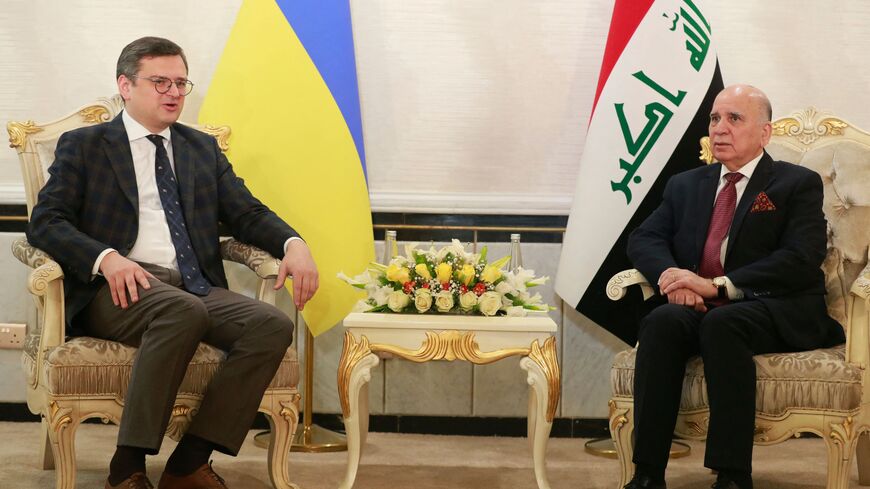In a major move last week, Kuwait became one of the few Middle Eastern countries to signal support for Ukraine’s post-war reconstruction.
On a visit to the Gulf state on April 18, Ukrainian foreign minister Dmytro Kuleba met with Waleed Al-Bahar, acting director of the Kuwait Fund for Arab Economic Development, to invite Kuwait to take part in the war-ravaged nation’s reconstruction.
“We discussed social and humanitarian projects, particularly school and hospital construction," Ukrainian media quoted Kuleba as saying.
Oleg Nikolenko, Ukraine’s foreign ministry spokesperson, said in an April 18 Facebook post that during Kuleba’s trip, Kuwait had announced $1 million for the purchase and installation of electric generators.
Kuwait is “exploring opportunities to join in Ukraine’s reconstruction, including through the Kuwaiti Arab Economic Development Fund, a financial institution that currently participates in development projects in multiple countries totaling $21.8 billion," he added. The funding will prioritize the building of new hospitals, schools, and kindergartens, Nikolenko said.
Ukrainian 'Marshall Plan'
Last month, a joint assessment by Ukraine’s government, the World Bank, the European Commission, and the United Nations estimated that the cost of reconstructing Ukraine is now at $411 billion. Since Russian President Vladimir Putin launched his full-scale invasion in February 2022, Western allies have made a raft of commitments to help rebuild the war-torn state. Italy will host a bilateral conference later this month on funding Ukraine’s reconstruction, while London will host a global conference in June for political and business leaders from all over the world.
However, Middle Eastern countries have not made much noise publicly on the subject. Many toe a fine line between supporting Ukraine and maintaining strong ties with Russia. Some analysts believe that Moscow has even developed stronger relationships in the region since the start of the conflict.
Last October, Turkey signed an agreement to help Ukraine with its reconstruction efforts. But that was before Turkey experienced one of the worst disasters in its history — a series of high-magnitude earthquakes in February this year. Nearly 46,000 people in Turkey died and the World Bank estimates damage at up to $35 billion, or 4% of the country’s GDP. Therefore, much of Ankara’s attention is now directed towards problems at home.
Kuwait's similarities with Ukraine
Kuwait’s show of support is an interesting move but not a surprising one, said Courtney Freer, visiting assistant professor of Middle Eastern studies at Emory College. The country has a history of assisting with post-war reconstruction — in 2018, Kuwait hosted the International Conference for the Reconstruction of Iraq following its war with the US-led coalition.
“In so doing, it played a major role in reintegrating Iraq into the broader Arab world,” Freer told Al-Monitor. “Further, as a state that has experienced invasion and occupation in its recent history, Kuwaiti authorities understand the challenges of post-war reconstruction.
“Kuwait is also famous for having a foreign policy focused on mediation and balancing, maintaining relations, for instance, with both Iran and Saudi Arabia long before their recent detente, and I see this act as part of that.”
Jonathan Panikoff, director of the Scowcroft Middle East Security Initiative at the Atlantic Council's Middle East Program, told Al-Monitor that Kuwait is “incredibly sensitive to hostile and unprovoked invasions from foreign states” because of its invasion by Iraq in August 1990, leading to the First Gulf War.
Like Ukraine is to Russia, Kuwait is also a smaller neighboring state to Iraq. Feb. 24, the day Russia invaded Ukraine, is also the anniversary of the ground war phase of the Gulf War which drove the final remaining Iraqi forces out of Kuwait.
Kuwait has been a loyal partner to Ukraine since the war began. It was one of only two Middle Eastern countries — along with Turkey — to back a US-sponsored resolution in February 2022 condemning Russia’s invasion. Kuwait co-sponsored the UNGA resolution rebuking Moscow the following month.
“It would not be a surprise to see Kuwait and Ukraine sign additional agreements, though being such a small country there are limits on how much reconstruction support Kuwait, alone, would be able to provide,” Panikoff said.
Other Middle Eastern support
Freer said oil-rich Middle Eastern countries could play a role in facilitating funding for reconstruction and potentially later becoming involved in investment projects.
“I think a lot depends, though, on how and for how long the war persists and how it ends. Kuwait, for its part, has been consistent in calling for a cease-fire, but we are not sure what terms of this would be and how this would place various MENA countries in terms of their ties with Russia and Ukraine.”
Panikoff is less convinced. “I’d expect that at the reconstruction summit in June in London they’ll seek to hedge, with some modest pledges of support but will largely defer to the US and European countries and institutions,” he said.
Kristian Ulrichsen, a fellow for the Middle East at the Baker Institute, told Al-Monitor that Middle Eastern countries might contribute through their aid and development or contributions to multilateral funding appeals or via support to United Nations agencies. He said that they might also direct investments into postwar Ukraine from sovereign wealth or other state-linked funds.
Competing interests
Analysts see challenges ahead in asking Middle Eastern states to reconstruct Ukraine, the obvious one being the seemingly impossible task of supporting Kyiv while appeasing Moscow.
Freer said Middle Eastern ties with Russia were nurtured before the invasion of Ukraine due to mutual investments and their role in global energy markets. But many countries in the region are also trying to maintain positive ties with the United States.
She added, “This has already proven a challenge when it comes to oil pricing. Recent efforts at reintegrating Syria, a key Russian ally, into the Arab League could also make it more difficult for Arab states to isolate Russia completely.”
Ulrichsen said that many Middle Eastern countries have been perceived as drawing closer to Russia over the course of the war, though this is less of an issue for Kuwait, a close US ally.
Panikoff believes the challenges Middle Eastern countries face in this domain are threefold. The first is making sure any support for Ukraine does not irk Moscow.
Secondly, few Middle Eastern countries have the funds to offer significant help. “Egypt, Jordan, Lebanon, and Tunisia are facing their own dire economic challenges,” Panikoff said, and the wealthier Gulf states such as Saudi Arabia, have their own competing priorities — such as diversifying their economies away from oil.
And finally, he said, wealthier Gulf states are probably thinking ahead to when "Syrian reconstruction begins in earnest, and with it will come an expectation of their financial support.”








